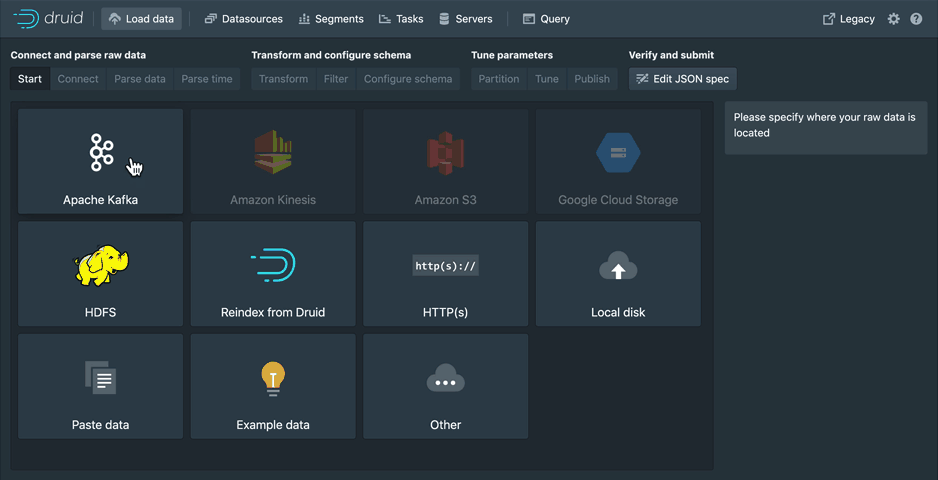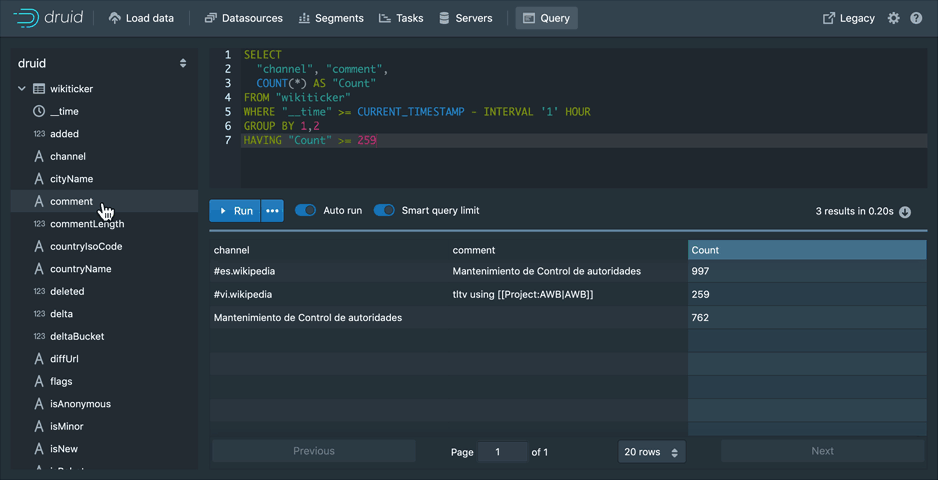### Description
This pr adds an api for retrieving unused segments for a particular datasource. The api supports pagination by the addition of `limit` and `lastSegmentId` parameters. The resulting unused segments are returned with optional `sortOrder`, `ASC` or `DESC` with respect to the matching segments `id`, `start time`, and `end time`, or not returned in any guarenteed order if `sortOrder` is not specified
`GET /druid/coordinator/v1/datasources/{dataSourceName}/unusedSegments?interval={interval}&limit={limit}&lastSegmentId={lastSegmentId}&sortOrder={sortOrder}`
Returns a list of unused segments for a datasource in the cluster contained within an optionally specified interval.
Optional parameters for limit and lastSegmentId can be given as well, to limit results and enable paginated results.
The results may be sorted in either ASC, or DESC order depending on specifying the sortOrder parameter.
`dataSourceName`: The name of the datasource
`interval`: the specific interval to search for unused segments for.
`limit`: the maximum number of unused segments to return information about. This property helps to
support pagination
`lastSegmentId`: the last segment id from which to search for results. All segments returned are > this segment
lexigraphically if sortOrder is null or ASC, or < this segment lexigraphically if sortOrder is DESC.
`sortOrder`: Specifies the order with which to return the matching segments by start time, end time. A null
value indicates that order does not matter.
This PR has:
- [x] been self-reviewed.
- [ ] using the [concurrency checklist](https://github.com/apache/druid/blob/master/dev/code-review/concurrency.md) (Remove this item if the PR doesn't have any relation to concurrency.)
- [x] added documentation for new or modified features or behaviors.
- [ ] a release note entry in the PR description.
- [x] added Javadocs for most classes and all non-trivial methods. Linked related entities via Javadoc links.
- [ ] added or updated version, license, or notice information in [licenses.yaml](https://github.com/apache/druid/blob/master/dev/license.md)
- [x] added comments explaining the "why" and the intent of the code wherever would not be obvious for an unfamiliar reader.
- [x] added unit tests or modified existing tests to cover new code paths, ensuring the threshold for [code coverage](https://github.com/apache/druid/blob/master/dev/code-review/code-coverage.md) is met.
- [ ] added integration tests.
- [x] been tested in a test Druid cluster.
Apache Druid
Druid is a high performance real-time analytics database. Druid's main value add is to reduce time to insight and action.
Druid is designed for workflows where fast queries and ingest really matter. Druid excels at powering UIs, running operational (ad-hoc) queries, or handling high concurrency. Consider Druid as an open source alternative to data warehouses for a variety of use cases. The design documentation explains the key concepts.
Getting started
You can get started with Druid with our local or Docker quickstart.
Druid provides a rich set of APIs (via HTTP and JDBC) for loading, managing, and querying your data. You can also interact with Druid via the built-in web console (shown below).
Load data
Load streaming and batch data using a point-and-click wizard to guide you through ingestion setup. Monitor one off tasks and ingestion supervisors.
Manage the cluster
Manage your cluster with ease. Get a view of your datasources, segments, ingestion tasks, and services from one convenient location. All powered by SQL systems tables, allowing you to see the underlying query for each view.
Issue queries
Use the built-in query workbench to prototype DruidSQL and native queries or connect one of the many tools that help you make the most out of Druid.
Documentation
See the latest documentation for the documentation for the current official release. If you need information on a previous release, you can browse previous releases documentation.
Make documentation and tutorials updates in /docs using Markdown or extended Markdown (MDX). Then, open a pull request.
To build the site locally, you need Node 16.14 or higher and to install Docusaurus 2 with npm|yarn install in the website directory. Then you can run npm|yarn start to launch a local build of the docs.
If you're looking to update non-doc pages like Use Cases, those files are in the druid-website-src repo.
Community
Visit the official project community page to read about getting involved in contributing to Apache Druid, and how we help one another use and operate Druid.
- Druid users can find help in the
druid-usermailing list on Google Groups, and have more technical conversations in#troubleshootingon Slack. - Druid development discussions take place in the
druid-devmailing list (dev@druid.apache.org). Subscribe by emailing dev-subscribe@druid.apache.org. For live conversations, join the#devchannel on Slack.
Check out the official community page for details of how to join the community Slack channels.
Find articles written by community members and a calendar of upcoming events on the project site - contribute your own events and articles by submitting a PR in the apache/druid-website-src repository.
Building from source
Please note that JDK 8 or JDK 11 is required to build Druid.
See the latest build guide for instructions on building Apache Druid from source.
Contributing
Please follow the community guidelines for contributing.
For instructions on setting up IntelliJ dev/intellij-setup.md


























